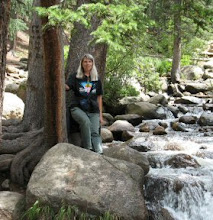We start out, I suspect, as observers and collectors. Many things in nature catch our eye, and we learn to see. But let Wilson describe it:
The mind with a search image is like a barracuda. The large predatory fish pays scant attention to the rocks, pilings, and vast array of organisms living among them. It waits instead for the glint of silver that betrays the twisting body of a smaller fish. ...
The human mind moving in a sea of detail is compelled like a questing animal to orient by a relatively few decisive configurations. There is an optimum number of such signals. ... Configurations with the greatest emotional impact are stored first and persist longer. Those that give the greatest pleasure are sought on later occasions. The process is strongest in children, and to some extent it programs the trajectory of their lives.
An excellent description of how we all often learn to see different things in nature; few of us can see everything. That's what makes it fun to go out with someone whose focus is on mushrooms, say, or geology. It opens your eyes to another world.
Beyond seeing, we move into caring. Wilson reports that "I rescued bits of Spanish moss that had fallen to the ground and replaced them on the low branches of the schoolyard oaks" in those early days in which, he says, "the course of my life had been set."
I suspect we all could report similar memories of childhood and youth, among the different animals and plants in whatever habitat we found ourselves. If we learn to appreciate one form of nature more than others, we may become specific kinds of naturalists, as birders or rockhounds. Failing that lesson, we may move into a life of perpetual distraction, or captivation, by whatever new thing crosses our path. I didn't have a "bug period" until grad school, when I moved to Arizona and was confronted with an amazing assortment of novel arthropods.
When I reopened this conversation, a natural history of naturalists perhaps, I confess I was thinking primarily of this kind of lifelong infatuation with the wild, general or specific. I'd momentarily forgotten the professional naturalist, those whose careers are often centered around sharing nature with children and others, another very important role.
But those who see—and often share—are important too. Today, consider checking out what Matt is doing over at Sitkanature.org, as "an aspiring naturalist learns his place." Beyond his inspiring blog from Alaska, he's also undertaken a huge effort, dare I say lifework?, to catalog 1,000 species from his chosen habitat. I, dilettante, am humbled by his dedication (not to mention his skills as a photographer).
——
Wilson, E.O. 1994. Naturalist. Island Press. 380 pp.
